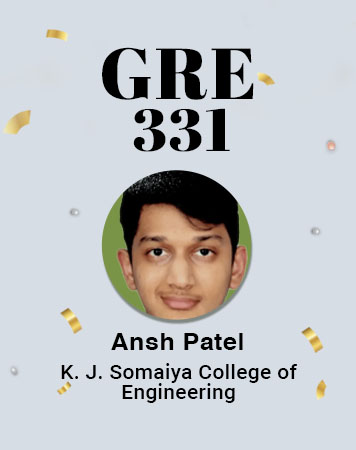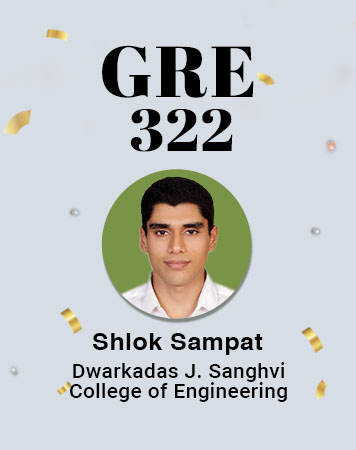Get in Touch
Call us on: +91 8928323711 / +91 9167255434
OR
Fill in the details to get personalized advice from our experts!
"*" indicates required fields
Choose the Program
Our Recent High Scores

Ashwini Nene
GRE 340/340
Sardar Patel Institute Of Technology

Rudresh Panchal
GRE 334/340
DJ Sanghvi College

Karan Lala
GRE 332/340
Thadomal Shahani Engineering College

Som Phene
GRE 332/340
Indian Institutes of Technology

Ansh Patel
GRE 331/340
K. J. Somaiya College of Engineering

Kunal Mehta
GRE 330/340
Mukesh Patel School Of Technology Management & Engineering

Padmaja Kolle
GRE 330/340
Vivekanand Education Society’s Institute of Technology

Jash Gaglani
GRE 327/340
K. J. Somaiya College of Engineering
What Our Students Say About Us
About GRE® Prep
What is the GRE test structure?
The GRE tests 3 skills: 1. Analytical Writing 2. Quantitative Reasoning, and 3. Verbal Reasoning The GRE test begins with the analytical writing measure.
The Analytical Writing measure consists of one writing task – Analyze an issue task. You have 30 minutes to type your response. The Analytical writing section is scored from 0-6 points.
Quantitative Reasoning: There will be two Quantitative Reasoning sections on the test with a total of 27 questions and you will have 47 minutes to complete both sections.. The score of the Quantitative Reasoning measure is from 130 to 170 points.
Verbal Reasoning: There will be two Verbal Reasoning sections on the test with a total of 27 questions and you will have 41 minutes to complete both sections. The score of the Verbal Reasoning measure is also from 130 to 170 points.
Shorter GRE Structure
| Skills | Sections | Durations | Scores |
| Analytical Writing | 1 Essay task | 30 minutes | 0-6 points |
| Quantitative Reasoning | Section 1: 12 questions
Section 2: 15 questions |
21 minutes
26 minutes |
130-170 |
| Verbal Reasoning | Section 1: 12 questions
Section 2: 15 questions |
18 minutes
23 minutes |
130-170 |
How is the GRE scored?
The Quantitative Reasoning section and the Verbal Quantitative Reasoning section are scored on a scale of 130-170 in 1-point increments. The Analytical Writing section is scored on a scale of 0–6 in 0.5 increments.
How long is the GRE test?
The overall testing time for the GRE ® General Test is about 2 hours.
How much does the GRE General Test cost?
The GRE® General Test fee varies according to the country. In India, the test fee is ₹ 22,550.
How can I register for the GRE?
The easiest way to register is through your ETS account. To create your account visit: https://www.ets.org/gre
GRE® is a registered trademark of Educational Testing Service.
FAQs
What is the full form of the GRE?
The GRE stands for “Graduate Record Examinations”.
Who owns the GRE?
The GRE is owned by Educational Testing Service (ETS). A private nonprofit educational testing and assessment organization based in the USA.
What is the purpose of the GRE?
The GRE General Test measures skills that graduate and professional schools have identified as necessary for academic success. The GRE General Test is designed to achieve a specific intended purpose that adds value to the admissions decision-making process. The GRE scores can:
- support institutions’ efforts to identify which applicants are academically prepared for graduate-level study
- provide a common, objective measure to help programs fairly compare applicants from different backgrounds
How is the GRE test administered?
The GRE test is administered online via two convenient options: Test at home, and Test at Center.
What is the meaning of the adaptive nature of the GRE test?
The Verbal Reasoning and Quantitative Reasoning sections are section-level adaptive. The first operational section of each measure (i.e., Verbal and Quantitative) is of average difficulty. The difficulty level of the second section of each of the measures depends on your overall performance on the first section of that measure.
For example, if for the Quantitative measure, you do very well on the first quant section, the second section of the Quant will be at a higher level of difficulty. If you have not done well in the first section, the second section might be easier or similar.
The computer selects the second operational section of a measure based on your performance in the first section.
How long does it take to get the official GRE score?
Your official GRE General Test scores will be available in your ETS account within 8-10 calendar days after your test date.
How long are GRE scores valid?
The GRE scores are valid for 5 years.
How soon can a candidate reappear for the test?
You can take the GRE test once every 21 days up to 5 times within any continuous rolling 12-month period.
What do I need to carry on the day of the GRE test?
- A valid acceptable ID proof (your passport)
- The acknowledgment letter (GRE registration)
What level of Math is tested on the GRE Quantitative Reasoning section?
The GRE General Test uses the foundations of high school math to test quantitative reasoning. The test material measures your ability to understand basic concepts of Arithmetic, Algebra, Geometry, and Data Analysis.
How many times is the GRE conducted in a year?
The GRE test is conducted 365 days in India.
How does one send scores to universities?
The universities only accept official scores sent directly by ETS. Scores to four colleges can be sent free of cost while taking the exam. Subsequently, for each score report sent to a college, you would have to pay USD 30.
What is the right time to start preparing for the GRE?
The earlier a student takes the GRE, the better it is. At higher grades, the study and co-curricular work increases. Moreover, the GRE score is valid for 5 years. So, it is advised to take the GRE in either the 2nd or in the 3rd year of your education in the case of a 4-yr undergraduate. The final year should be kept for application planning.
Are the GRE scores mandatory for admissions?
The GRE scores are prerequisites for admissions to qualify for Masters and PhD programs in the US. More than 1,300 business schools worldwide welcome GRE General Test scores for admission to some or all of their MBA programs. In addition, there are many specialized master’s and doctoral programs in business that accept GRE General Test scores.
What is a STEM Program?
STEM fields include Science, Technology, Engineering, and Mathematics. As per this program, students graduating from a STEM-designated program are eligible for student visas for an additional 36 months extension on the Optional Practical Training (OPT).
What are the GRE Subject Tests?
The GRE Subject Tests are achievement tests that measure your knowledge and skill level in a particular field of study. They’re intended for students who have an undergraduate major or extensive background in one of the following disciplines:
- Chemistry
- Mathematics
- Physics
- Psychology
These tests are given separately from the GRE General Test and require additional fees of US $ 150. Check with the graduate schools to which you are applying to determine whether any of these extra tests are required. You must take these tests only if a university asks for them. Moreover, it is mainly taken by those students who wish to specialize in explicit areas like Math, Physics, etc.
The GRE Subject Tests are offered up to three times a year in September, October, and April at computer-delivered centers worldwide.


























